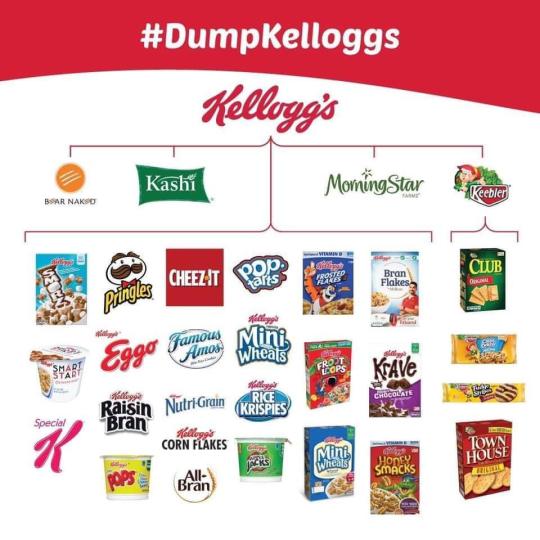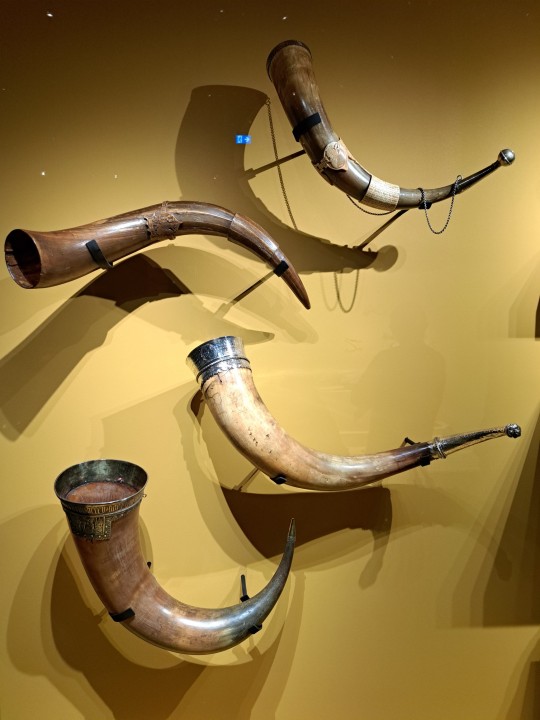Food, drink, history, culture and politics❤️ www.historicusindekeuken.nl
Don't wanna be here? Send us removal request.
Text
So, Kellogg's Boycott. Again. Haven't seen any posts about it here yet, so figured I'd make one.
In short: We're all tired of these big companies gouging their prices just because they can, and calling it 'inflation.' We're tired of companies announcing record profits while they cut bonuses/lay people off/force workers to run on skeleton crews/etc. We're tired of "Shrinkflation" And we're tired of a bunch of other shit too, but you get my point.
So, vote with your wallet.
On April 1st, stop buying Kellogg's, and keep that up until June 30th. Just three months- just one quarter of the fiscal year. Companies report earnings each quarter, and if their earnings drop it will reflect in these quarterly reports.
Why Kellogg's?
Because their CEO recently pulled a "Let them eat cake." TLDR; Kellogg's has raised prices by 28% across the board, bragged about record breaking profits, and then suggested that families struggling to afford groceries, because of aforementioned price gouging, just "eat cereal for dinner!"
And well, that message was not well received by anyone, as one could imagine. Pissed a lot of people off.
So yeah. The plan is to stop buying any Kellogg's products (below) for the entirety of the second quarter (April 1st-June 30th) and to collectively tell Kellogg to fuck off until they lower their prices. The goal isn't to "destroy the company" or cost anyone their jobs- but we will hit them where they will listen. Their profits.
If they don't listen, then we don't come back, and we start in on the next company, and keep going until they all get the message. There's always alternatives (more on that below) and we don't need them. If they refuse to drop their prices, then we just stick with the alternatives we found.


Three months is a minor inconvenience to teach a corporation a lesson, and we can do it.
So, take this month before April to find your alternatives. If you need help, I based a non-comprehensive list (below) off the image above. There's tons more just a google search away, and I bet others have made lists as well. There's also always the option to make your own. There's tons of recipes online showing how to make dupes of your favorite products.

Some things to note:
Don't go stocking up on your favorite Kellogg's products the last week of March and think you're not crossing the picket line. The point is to make Kellogg's feel the loss in profits, and stocking up on Cheez-its beforehand will defeat the purpose. I sincerely promise you can make it three months without buying Kellogg's. Again, three months is a minor inconvenience to teach a corporation a lesson, and we can do it.
That said, Safe Foods are acknowledged. If you or your child is neurodivergent and has issues with food (i.e: literally won't be won't be able to eat at all without their safe food) you get a pass. By all means feel free to try and find alternatives, but it's very unlikely that the few who can't boycott will cause it to fail. There should be plenty of the rest of us to pick up the slack.
Don't be a bystander- meaning don't go about this thinking "Oh, well surely there's enough people boycotting that it's fine if I just-" No. If we ever want things to change then we need to be strong enough to do even something as small as not buying something we like for three months. Furthermore, it's on those of us who can afford Kellogg's products to boycott Kellogg's. It's not the responsibility of those who already can't afford Eggos to boycott Eggos. Nothing will change if you go about just assuming everyone else already has it handled for you. Take a stand.
And importantly, Spread the word. This only works if we let as many people as possible know about it.
So reblog this post, or make your own post, or both. Even feel free to copy and paste this entire post off-platform if you need to. I've also seen some suggest making flyers, or even just writing on post-it notes, and sticking them to Kellogg's products in the store to spread the word off-line.
Just get the word out there. If we ever want these companies to stop gouging us for every cent we've earned, then we have to make a stand somewhere.
If we do nothing it will only ever get worse.
144 notes
·
View notes
Text

my easily jumpscared gf has her back to the door in our new place and every time i need to announce myself like im an angel of god
45K notes
·
View notes
Text
Interesting! Are cubans even capable of digesting lactose? Most people in de world aren't.
Fidel Castro, the iconic Cuban revolutionary leader, was known for his unconventional passions, one of which was a deep-seated love for dairy farming. Castro's affinity for dairy products was not merely gastronomic; it extended to his personal involvement in cattle farming, exemplified by his close relationship with Ubre Blanca, a famous Holstein cow.
Ubre Blanca, meaning "White Udder" in Spanish, gained international fame as one of the world's most productive dairy cows during the 1980s. Castro's dedication to improving Cuba's milk production led him to personally oversee Ubre Blanca's care and breeding. The cow became a symbol of the Cuban government's efforts to achieve self-sufficiency in dairy production, showcasing the leader's hands-on approach to governance.
Castro's passion for dairy farming reflected his broader vision of creating a self-sufficient and sustainable socialist society in Cuba. He believed that a strong agricultural base, including dairy production, was crucial for the country's economic independence. While his leadership style was often controversial, his commitment to improving agricultural practices, including the dairy industry, left a lasting impact on Cuba's development.
Fidel Castro's unusual love for Ubre Blanca and his hands-on involvement in dairy farming underscored the multifaceted nature of his leadership, showcasing a side of him that went beyond the political stage and into the realms of agriculture and personal dedication to his country's progress
15 notes
·
View notes
Text
@princekouta purchasing and showing us what’s in these air drops that are being dropped on the starving population of Gaza. Like Ahmed said, this is more torture then it is aid.
144 notes
·
View notes
Text

Fannie Lou Hamer and the Freedom Farm cooperative
Fannie Lou Hamer was an extraordinary civil rights activist born on October 6, 1917, in Montgomery County, Mississippi, United States. Her life was imbued with struggle, courage and dedication to the fight against racial discrimination and for civil rights. She grew up in poverty, at a time when black people in the southern United States faced widespread oppression and segregation.
Hamer was tireless in her pursuit of equality and justice. Her activism began to take shape in the 1960s, when she became involved in the civil rights movement, most notably the Mississippi Freedom Summer of 1964. She became a prominent member of the Student Nonviolent Coordinating Committee (SNCC) and played a crucial role in mobilizing black voters in the South despite severe opposition and intimidation.
One of Fannie Lou Hamer's most notable achievements was the founding of the Freedom Farms Cooperative, which played a central role in the economic empowerment of black farmers in Mississippi. The Freedom Farms were founded as a response to the widespread discrimination and economic disadvantage faced by black farmers. Hamer believed strongly in economic autonomy and food sovereignty as a key to liberation and equality for black communities.
The Freedom Farms were intended not only as a source of income, but also as a symbol of self-reliance and resistance to oppression. Hamer believed that black farmers should be able to own and cultivate their own land without being oppressed. The cooperative provided training, support, and collective resources to black farmers, allowing them to organize and improve their agricultural operations.
The success of the Freedom Farms was remarkable and inspired many others in the civil rights movement and beyond. It served as a model for economic self-reliance and community building during a time of intense racial tensions and social unrest. Hamer and her fellow activists used the Freedom Farms as a platform to draw attention to the structural inequalities Black farmers faced and to advocate for change at both the local and national level.
In addition to her work with the Freedom Farms, Fannie Lou Hamer remained a tireless advocate for civil rights, continually drawing attention to issues such as voting rights, education, healthcare and poverty alleviation. Her determination and courage often brought her into conflict with the powers that be, but she continued her fight tirelessly, even in the face of serious setbacks and personal tragedies.
Hamer was a staunch advocate for women's rights. As an African-American women, she emphasized the importance of equal rights for black women, and her courageous actions led to change, including being a role model and as co-founder of the Mississippi Freedom Democratic Party, she ensured equal representation for black women within the Democratic Party. In addition, her efforts led to greater recognition of what we today call intersectionality; the coincidence of various forms (race, gender, sexual orientation) of social injustice, inequality and oppression.
Fannie Lou Hamer died on March 14, 1977, but her legacy lives on in the ongoing fight for equality and justice. Her contributions to the civil rights movement and her commitment to economic justice continue to inspire and motivate people around the world. The Freedom Farms remain a monument to her vision of empowerment and community, and a reminder of the power of determination and collective action in the fight against oppression and inequality.
1 note
·
View note
Text

Les Club des Chefs des Chefs: cooking for heads of state
"Les Club des Chefs des Chefs" is an exclusive and unique organization that brings together the personal chefs of heads of state from around the world. Founded in 1977 by Gilles Bragard, a French businessman and passionate gastronome, the club provides a platform for the private chefs who cater to the culinary needs of presidents, prime ministers, and monarchs.
The club's primary mission is to develop camaraderie and exchange among these elite chefs, creating a forum for them to share their experiences, challenges, and innovative culinary techniques. The gatherings offer a rare opportunity for these professionals to connect on a personal and professional level, transcending the boundaries of politics through their shared love for gastronomy.
Members of the Club des Chefs des Chefs meet annually in various global locations, hosting each other in their respective countries. These meetings provide a unique cultural exchange, allowing chefs to explore local cuisines and ingredients while forging bonds with their international counterparts. The chefs often collaborate on special events, creating extraordinary dining experiences that display the diversity of global culinary traditions.
In addition to fostering camaraderie, the club also engages in charitable activities. The chefs frequently participate in events and initiatives aimed at promoting social causes and use their culinary skills for the greater good.
The club's exclusivity adds to its mystique, as membership is reserved for the personal chefs of heads of state. This select group ensures a level of confidentiality and discretion, allowing members to freely share their experiences without concerns about political sensitivities.
The Club des Chefs des Chefs serves as an example to the universal language of food, transcending political boundaries and developing connections among those who play a crucial role in shaping the gastronomic preferences of world leaders. It stands as a symbol of the power of culinary diplomacy, displaying how a shared passion for food can bring people together, even in the highest circles of global governance.
#gastrodiplomacy#food history#cuisine#drink history#softpower#clubdeschefsdeschefs#culinairydiplomacy#chefs#cooking
0 notes
Text

Tariq Ali's "Churchill: His Times, His Crimes" delves into the complex persona of one of Britain's most celebrated figures, Winston Churchill. Ali, known for his sharp analysis and unapologetic critique of historical figures, provides a refreshing and critical perspective on Churchill's life and legacy.
Ali's work challenges the conventional narrative surrounding Churchill, which often portrays him as a hero of World War II and a champion of democracy. Instead, Ali meticulously examines Churchill's actions and policies, exposing the darker aspects of his leadership.
One of the most compelling aspects of Ali's analysis is his exploration of Churchill's imperialist tendencies. Ali highlights his role in perpetuating British colonialism and his ruthless suppression of anti-imperialist movements, particularly in India and Africa. Ali argues that Churchill's policies directly contributed to the suffering and oppression of millions of people across the British Empire.
Moreover, Ali scrutinizes Churchill's attitudes towards race and ethnicity, revealing deeply ingrained prejudices and racism that manifested in his policies and rhetoric. By contextualizing Churchill's views within the broader framework of colonialism and racism, Ali offers a nuanced understanding of the man behind the myth.
Ali's writing is both engaging and thought-provoking, weaving together historical analysis with intelligent commentary. He skillfully deconstructs Churchill's persona, forcing readers to confront uncomfortable truths about one of history's most revered figures.
While some readers may find Ali's critique of Churchill unsettling, his work serves as a necessary reminder of the complexities of history. The biography is a compelling and timely exploration of one of history's most influential figures. Tariq Ali's unflinching critique forces readers to confront the contradictions and complexities of Churchill's legacy, making this book essential reading for anyone interested in understanding the true impact of Britain's wartime leader.
About Imperial Stout:
Imperial Stout beer is a bold and robust style known for its intense flavors and high alcohol content. Originating in 18th-century England, it was brewed to withstand long journeys to the Russian Imperial Court, hence the name. Furthermore, Churchill’s legacy is tainted with his imperialist perspective, racism and crimes. So it is fitting that the producer (Frontaal, Breda) of this beer linked Churchill with a imperial stout (11%)
This beer boasts a rich, dark color with notes of roasted malts, chocolate, coffee, and sometimes even hints of dark fruits. Its full-bodied texture and high alcohol by volume (ABV) create a warming sensation, making it perfect for sipping on cold nights. With its deep complexity and often luxurious mouthfeel, Imperial Stout remains a favorite among craft beer enthusiasts seeking intense and flavorful experiences.
Further reading, listening and watching:
Ali, Churchill: His Times, His Crimes. 2022, Verso Books.
1 note
·
View note
Text
Fidel Castro, the iconic Cuban revolutionary leader, was known for his unconventional passions, one of which was a deep-seated love for dairy farming. Castro's affinity for dairy products was not merely gastronomic; it extended to his personal involvement in cattle farming, exemplified by his close relationship with Ubre Blanca, a famous Holstein cow.
Ubre Blanca, meaning "White Udder" in Spanish, gained international fame as one of the world's most productive dairy cows during the 1980s. Castro's dedication to improving Cuba's milk production led him to personally oversee Ubre Blanca's care and breeding. The cow became a symbol of the Cuban government's efforts to achieve self-sufficiency in dairy production, showcasing the leader's hands-on approach to governance.
Castro's passion for dairy farming reflected his broader vision of creating a self-sufficient and sustainable socialist society in Cuba. He believed that a strong agricultural base, including dairy production, was crucial for the country's economic independence. While his leadership style was often controversial, his commitment to improving agricultural practices, including the dairy industry, left a lasting impact on Cuba's development.
Fidel Castro's unusual love for Ubre Blanca and his hands-on involvement in dairy farming underscored the multifaceted nature of his leadership, showcasing a side of him that went beyond the political stage and into the realms of agriculture and personal dedication to his country's progress
#food history#fidel castro#ubre blanca#cuba#communism#dairy#cow#cold war#dairy history#drink history
15 notes
·
View notes
Text

Following a government ban on alcohol for Black South Africans, consumption went underground in so-called shebeens. These were locally run establishments where liquor and beer were sold illegally. The municipal response was to legalize the consumption of government-sanctioned 'Bantu beer' in city-run beer gardens. Ernest Cole (1940-90) photographed both legal and illegal drinking establishments, dismissing 'Bantu beer' as a means for the government to capitalize on the human need to forget.
Until the government went into the business of selling liquor to Africans, it was illegal for them to drink. They did drink in places called shebeens, where many still prefer to gather, despite the threat of police raids.
"Mostly it is the feeling that this is his sanctuary, a place where he isn't feeding the government coffers every time he buys a drink, a place where he can sit at ease among his own kind and talk, drink, and be himself. The threat of a raid continues, but it is worth the risk.(...) If a man can't drown his troubles away, at least he can make them float for a while"
Original text from the exhibition 'House of Bondage' by the South African photographer Ernest Cole @foam_amsterdam
#ernestcole #southafrica #apartheid #bantubeer #shebeens #township #beer #liquor #foodhistory #drinkhistory #photography #bantustan
1 note
·
View note
Text

Johannes Steendam - Orang Kaya (Indonesian leaders), 1621. Skulls carved out of nutmeg. 1621 is the year the Dutch United East-India company (VOC) committed genocide on the Banda islands to secure the nutmeg monopoly
2 notes
·
View notes
Text

Frisian drinkinghorns at the exhibition 'Freedom, Feuds, Purgatory: the Middle Ages in the North'
Drinkinghorns are horns of generally bovine animals that are used by people to drink beer or mead (alcoholic fermented honey drink) from. Old Germanic peoples like Vikings, Saxons and Frisians are usually linked to these types of drinkingvessels, but in Asia and Africa cattleherding people are also known to use them.
Drinking from horns isn't a practical occurence. The chape prohibits it from putting the object down. That's why horns were used to pass around during celebrations and religious rituals or to drink the content in one go.
#food history#frisian#drinking horns#beer#friesmuseum#germanic paganism#mead#middle ages#drink#bovine#vikings#anglo saxon
60 notes
·
View notes